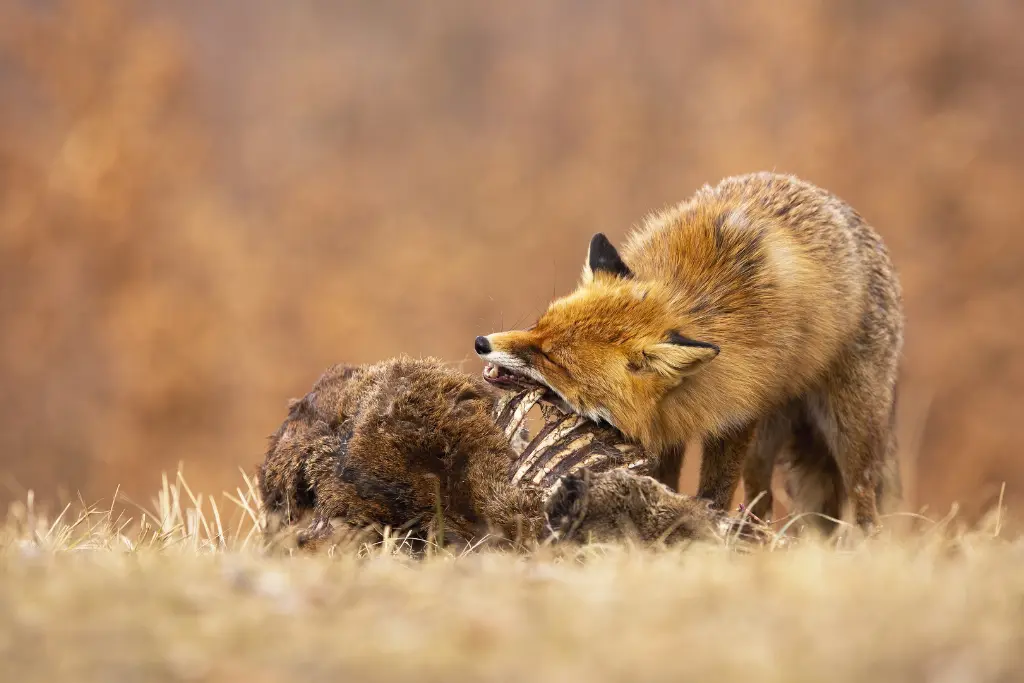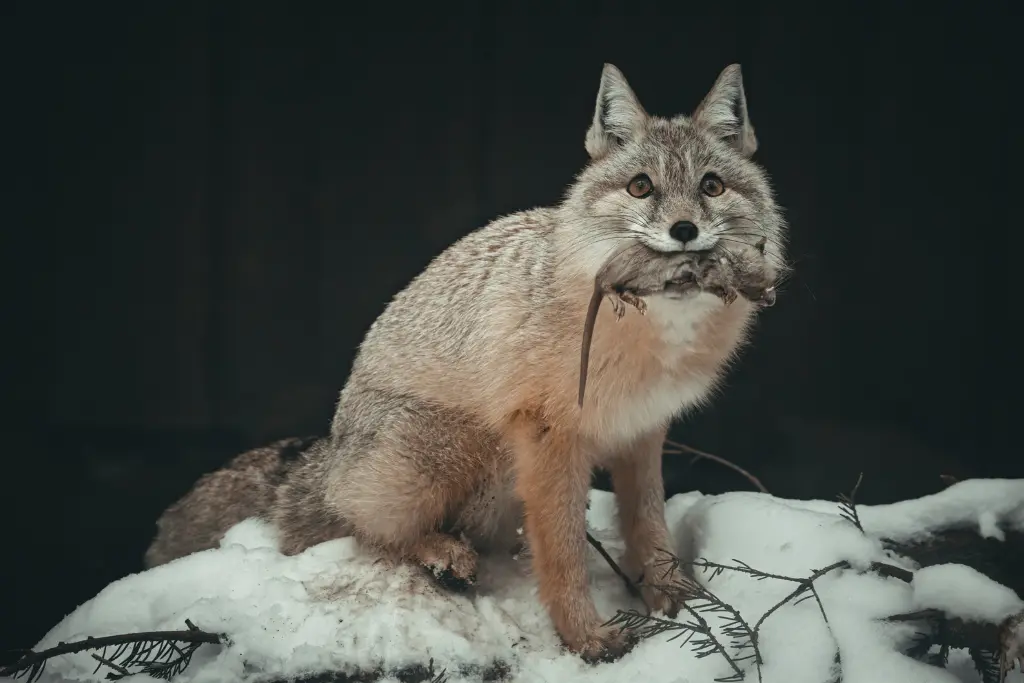Foxes in particular are noted for their distinctive coat and foxy dispositions, sparking interest among nature enthusiasts and bystanders too. Foxes’ ability to adapt to various climatic conditions worldwide has resulted in their being regarded as pliable creatures. One exciting factor in their biology is their dietary conduct, prompting the question Are foxes omnivores? The exploration will discuss in detail why foxes lose weight through the evidence demonstrating they are omnivorous with food components comprised of different inputs such as animal tissues, plant matter like fruits, etc., leading them towards surviving under various circumstances.
The Taxonomic Context
It is important to first understand the taxonomic setting before delving into the detailed food plan for foxes. These are members of the family called canidae which include Wolves, Dogs, and many more Carnivorous animals related to them. Nevertheless, members of the Canidae family are not always committed to having a diet for carnivorous weight-loss plans, as exemplified by the eating habits of foxes.
What Do Foxes Eat?
Foxes are known as opportunistic eaters because if it is there so it eats. Their weight loss program commonly includes:
- Rabbit, mice, and voles—small mammals.
- Birds and fowl eggs
- Reptiles, including snakes and lizards
- For instance, amphibians comprise of frogs and toads.I/
- Fish
- Insects
- Fruits and berries
- Vegetables
- Seeds and nuts
Additionally, it feeds on scraps and carcasses. Foxes can as well feed on trash or dog food in urban zones.
Fox Species and Their Diets
Foxes exist in many different locations across the globe and their dietary options will predominantly depend on specific characteristics such as habitat, food sources availabilities among others, together with peculiar forms for specific foxes. An example of one of the most popular fox species (the crimson fox) that allows scientists to learn about omnivorous nature is the red fox (Vulpes vulpes).
Red Fox Diet
Carnivorous Inclinations: Red foxes are mainly carnivorous but a good part of their food that includes rodents, rabbits, and birds. Because of their acute earsight and eye sight, they become daring hunters.
Versatility in Diet: They have their unique ability of being extremely adaptable. Carnivores in most cases, but can be opportunists, changing their diet according to the availability in the environment. The resilience helps them survive in different environments.
Arctic Fox Diet:
Nutritional strategy particular to Arctic fox is Vulpes lagopus tuned up for severe conditions in the Arctic. The smaller foxes hunt other small mammals that include berry trees. Such flexibility enables them to withstand the harsh conditions of the Arctic tundra.
Gray Fox Diet:
Similarly, a gray fox or Urocyon cinereoargenteus, is one of the most omnivorous animal specie in the category of foxes. Adaptations of these animals also include their variety in food source; they sometimes eat snakes and birds, while most often consuming rabbits and rodents, as well as fruits, insects, and plants.
How Do Foxes Hunt?
Foxes are incredible hunters. They have a good sense of smell, hearing, as well as speed and tact. Foxes use a number of hunting strategies, which includes:
– Stalking their prey: As such, foxes will patiently walk after their prey until they can come in close enough to attack.
– Ambushing their prey: Fox waits and masks its track and then it leaps on prey after getting near.
– Chasing their prey: Foxes may even run down its prey until it can no longer stand.
Foxes also work together in searching. Another instance could be that two pairs of foxes come together to flush out prey hidden somewhere.
Omnivorous Adaptations
Dental Adaptations
Dentition often stands as one of the most telling things concerning an animal’s feeding strategies. The fox’s tooth is set to display its omnivory. They have dog-like but sharp teeth for shooting and ripping flesh while they also posses molar teeth suitable for crushing of plant material. This dental model allows for a large number of food types that enable fox to clean orally.
Behavioral Flexibility
The behavioral flexibility of the types of foraging by foxes is great. The fact that they could substitute between hunting and scavenging, as well as including plant’s quantity in their diets, shows their ability to adjust to environmental changes. Omnivory implies some degree of behavioural flexibility which may be another important aspect of this behavioural flexibility.

Are Foxes Cannibals?
There is one more question I often see around that involves foxes and especially coyotes—are they cannibalistic? However, there have been occasional cases of cannibalism among opportunistic eating foxes, though it is exceedingly rare. Foxes are also forced to turn into cannibals for survival when food is rare in harsh condition. Nonetheless, they don’t take it on a daily basis as their diet.
Unraveling the Carnivore, Herbivore, or Omnivore Mystery
However, a perception exists that carnivores are separate and distinct from other food groups like omnivore and herbivore. Fox indeed fits under omnivores, as they can eat any nutrients produced on both plant and animal based foodstuffs. Thus, such flexibility allows them to survive in almost all possible ecosystems.
Human Interaction and Culinary Curiosity
It goes beyond medical curiosity to questions of human and fox culture as well as gastronomy. It should be emphasised, fox is not traditionally edible for most people but historical moments indicate that people survived by fox eating few instances. Nevertheless, it must be pointed out that finding and swallowing foxes are not usual activities nowadays.
Seasonal Variations in Diet
In addition, changes in the supply of prey, weather conditions, and the reproductive cycle during the seasons may lead to seasonal variation in the diet of the foxes. However in spring and summer seasons foxes might have a larger share of searching in order to prey upon small mammals which are plentiful at the time. Rather, there would be no hunting and meat eating to survive in winter because there were not enough prey, which they could instead switch to scavenging and eating raw plants.
Human-Fox Interactions
Foxes seem to be surprisingly capable of adapting to human settlements, despite intrusion into their herbal habitats by human development. In cities, they will dig through garbage cans, dine upon unwanted leftovers from human feasts, and eat dropped harvest from gardens. The fox’s ability to adopt itself to different situations shows it is an omnivorous. Such inclination has enabled fox to exploit many food sources that are available for survival.
Facts And FAQs
Are Foxes Omnivores or Carnivores?
This is necessary for the sake of clarifying that foxes, contrary to what might be assumed, are actually omnivores. However, they contain meat even though they are not strictly carnivorous. The palate is very flexible in case of foxes, that is why they eat many products like fruits, berries, insects, and even small mammals. The fact that they are flexible in diet is one of the ways how they manage to survive in different conditions.
Wolves: Omnivores within the Wild
It is exciting to see wolves which are cousins to foxes also classified as omnivores having mounted that foxes are omnivores. The wolves are normally referred to as dangerous carnivores but in reality they perform much more than being flesh eaters since they have multiple types of diet that include plants therefore being omnivorous in definition. In turn, this adaptability allows them to survive in different environments.
Foxes: Mammals of Cunning Intelligence
To this end, that a fox is a mammal is unequivocally YES. Elegant Mammalia, such as their tendency towards living longer, having breasts for nourishing babies, and sporting hairs or furs, comprises the foxes. Foxes are the best representatives of a mammalian lineage with its unique “fuzzy” tails and fox-like brains.
What Does a Fox Eat?
Exploring the feeding habits of foxes for better understanding of foxes in entirety. The foxes are opportunity feeders where they change their diet basing on the availability of foods in their habitat. Small mammals such as rodents, birds snails among others can constitute their meals along with fruits and plants. This makes them be in a position to survive in different ecosystems such as their urban landscape and country side forests.
Benefits of Being an Omnivore
Omnivores have many advantages. To begin with, omnivores are in a position to choose from numerous food options than herbivore diets. It is easier for them to find food and also receive their desired vitamin supplements.
Omnivores can also adapt better to changes in their surroundings. An example is if their single meals’ source becomes sparse, omnivores resort to other food source.
Lastly, unlike carnivores, omnivores face a lower possibility of competing with other animals for food. This is because they tend to have more choice from their large variety of meal selections.
Challenges of Being an Omnivore
Omnivores have some challenging conditions, too. Firstly, omnivores require the stomach acidity in order to easily process both herbaceous plants and proteins. This requires a particular digestive organ.
Moreover, in case omnivores are hungry, they have another way of finding several food sources. This can be hard in several instances, especially during the winter’s period.
Lastly, omnivores are prone to diseases that are borne through plant and animal as vectors.
Conclusion
Eventually, the last question whether or not foxes can be classified as omnivores receives a loud yes. Diverse fox species’ varied dietary habits together with their anatomical and behavioural adaptation emphasize on their omniscience trait. Likewise, the fact that they can survive in different environments from a crowded forest to modern city settings, shows the power of their diet. Omnivorous nature is one of these charismatic animals’ most essential adaptations while navigating an ever-changing world. A proper understanding of the mysteries behind a foxes diet and weight management program doesn’t just enhance our appreciation towards these mysterious creatures but it is an invaluable tool to better appreciate interdependence of other species within multiple ecosystems.


Highly descriptive article, I loved that bit. Will there be a part 2?wholesale mlb jerseys
Woah! I’m really loving the template/theme of this
blog. It’s simple, yet effective. A lot of times it’s hard to
get that “perfect balance” between superb usability and visual appeal.
I must say you’ve done a fantastic job with this. Also, the blog loads
very quick for me on Chrome. Outstanding Blog!